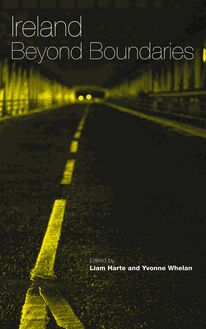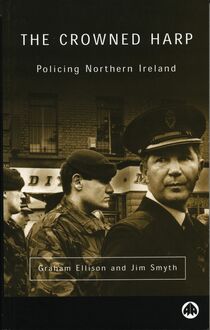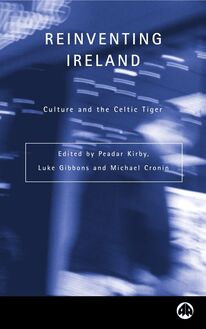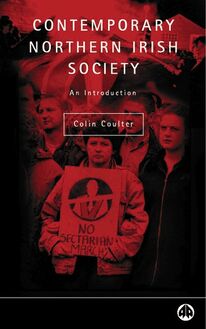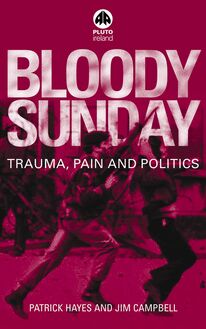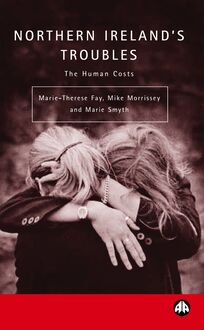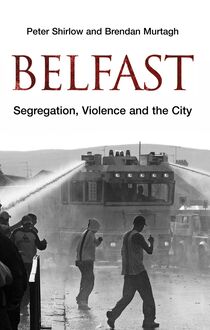-
 Univers
Univers
-
 Ebooks
Ebooks
-
 Livres audio
Livres audio
-
 Presse
Presse
-
 Podcasts
Podcasts
-
 BD
BD
-
 Documents
Documents
-
- Cours
- Révisions
- Ressources pédagogiques
- Sciences de l’éducation
- Manuels scolaires
- Langues
- Travaux de classe
- Annales de BEP
- Etudes supérieures
- Maternelle et primaire
- Fiches de lecture
- Orientation scolaire
- Méthodologie
- Corrigés de devoir
- Annales d’examens et concours
- Annales du bac
- Annales du brevet
- Rapports de stage
La lecture à portée de main
286 pages
English
Découvre YouScribe en t'inscrivant gratuitement
Je m'inscrisDécouvre YouScribe en t'inscrivant gratuitement
Je m'inscris
Obtenez un accès à la bibliothèque pour le consulter en ligne
En savoir plus
En savoir plus
286 pages
English
Obtenez un accès à la bibliothèque pour le consulter en ligne
En savoir plus
En savoir plus

Description
This is an an authoritative, up-to-date account of the development of Irish Studies over the past two decades.
The authors examine the key debates that have underpinned recent scholarship and analyse critical concerns that have shaped the subject’s remarkable growth.
They trace the institutional fortunes of Irish Studies in Ireland, the USA, Canada, Australia and Britain and features in-depth critical accounts of specific trends and themes within Irish historiography, literary criticism, religion, migration, music, cultural geography, sport and media culture.
Notes on Contributors
Acknowledgements
Introduction: where Irish Studies is bound by Liam Harte
Part I: Irish Studies in Practice
1. Changing transatlantic contexts and contours: Irish Studies in the United States by Christina Hunt Mahony
2. Re-configuring Irish Studies in Canada: writing back to the centre by Michael Kenneally
3. 10,000 miles away: Irish Studies Down Under by Elizabeth Malcolm
4. 'Our revels now are ended': Irish Studies in Britain - origins and aftermath by Shaun Richards
5. Teaching Irish Studies in Ireland: after the end by Michael Brown
Part II: Irish Studies in Critical Perspective
6. The intellectual and the state: Irish criticism since 1980 by Conor McCarthy
7. Forty shades of grey?: Irish historiography and the challenges of
multidisciplinarity by Mary E. Daly
8. The religious field in contemporary Ireland: identity, being religious and symbolic domination by Tom Inglis
9. 'A decent girl well worth helping': women, migration and unwanted pregnancy by Louise Ryan
10. Beating the bounds: mapping an Irish mediascape by Lance Pettitt
11. Placing geography in Irish Studies: symbolic landscapes of spectacle and memory by Yvonne Whelan and Liam Harte
12. Listening to the future: music and Irish Studies by Gerry Smyth
13. Beyond sectarianism: sport and Irish culture by Mike Cronin
Bibliography
Index
The authors examine the key debates that have underpinned recent scholarship and analyse critical concerns that have shaped the subject’s remarkable growth.
They trace the institutional fortunes of Irish Studies in Ireland, the USA, Canada, Australia and Britain and features in-depth critical accounts of specific trends and themes within Irish historiography, literary criticism, religion, migration, music, cultural geography, sport and media culture.
Notes on Contributors
Acknowledgements
Introduction: where Irish Studies is bound by Liam Harte
Part I: Irish Studies in Practice
1. Changing transatlantic contexts and contours: Irish Studies in the United States by Christina Hunt Mahony
2. Re-configuring Irish Studies in Canada: writing back to the centre by Michael Kenneally
3. 10,000 miles away: Irish Studies Down Under by Elizabeth Malcolm
4. 'Our revels now are ended': Irish Studies in Britain - origins and aftermath by Shaun Richards
5. Teaching Irish Studies in Ireland: after the end by Michael Brown
Part II: Irish Studies in Critical Perspective
6. The intellectual and the state: Irish criticism since 1980 by Conor McCarthy
7. Forty shades of grey?: Irish historiography and the challenges of
multidisciplinarity by Mary E. Daly
8. The religious field in contemporary Ireland: identity, being religious and symbolic domination by Tom Inglis
9. 'A decent girl well worth helping': women, migration and unwanted pregnancy by Louise Ryan
10. Beating the bounds: mapping an Irish mediascape by Lance Pettitt
11. Placing geography in Irish Studies: symbolic landscapes of spectacle and memory by Yvonne Whelan and Liam Harte
12. Listening to the future: music and Irish Studies by Gerry Smyth
13. Beyond sectarianism: sport and Irish culture by Mike Cronin
Bibliography
Index
Sujets
Informations
| Publié par | Pluto Press |
| Date de parution | 20 novembre 2006 |
| Nombre de lectures | 0 |
| EAN13 | 9781849642279 |
| Langue | English |
| Poids de l'ouvrage | 2 Mo |
Informations légales : prix de location à la page 0,6250€. Cette information est donnée uniquement à titre indicatif conformément à la législation en vigueur.
Extrait
Ireland Beyond Boundaries
Mapping Irish Studies in the Twenty-first Century
Edited by LIAM HARTE and YVONNE WHELAN
P Pluto Press LONDON • DUBLIN • ANN ARBOR, MI
First published 2007 by Pluto Press 345 Archway Road, London N6 5AA and 839 Greene Street, Ann Arbor, MI 48106
Distributed in the Republic of Ireland and Northern Ireland by Gill & Macmillan Distribution, Hume Avenue, Park West, Dublin 12, Ireland. Phone +353 1 500 9500. Fax +353 1 500 9599. E-Mail: sales@gillmacmillan.ie
www.plutobooks.com
Copyright © Liam Harte and Yvonne Whelan 2007
The right of the individual contributors to be identified as the author of this work has been asserted by them in accordance with the Copyright, Designs and Patents Act 1988.
British Library Cataloguing in Publication Data A catalogue record for this book is available from the British Library
Hardback ISBN-13 ISBN-10
Paperback ISBN-13 ISBN-10
978 0 7453 2186 8 0 7453 2186 0
978 0 7453 2185 1 0 7453 2185 2
Library of Congress Cataloging in Publication Data applied for
10
9
8
7
6
5
4
3
2
1
Designed and produced for Pluto Press by Chase Publishing Services Ltd, Fortescue, Sidmouth, EX10 9QG, England Typeset from disk by Stanford DTP Services, Northampton Printed and bound in the European Union by Antony Rowe Ltd, Chippenham and Eastbourne, England
List of Figures and Tables Acknowledgements
Cont
e
nt
s
Introduction: Where Irish Studies Is Bound Liam Harte
Part One: Irish Studies in Practice
1
2
3 4
5
Changing Transatlantic Contexts and Contours: Irish Studies in the United States Christina Hunt Mahony Reconfiguring Irish Studies in Canada: Writing Back to the Centre Michael Kenneally 10,000 Miles Away: Irish Studies Down Under Elizabeth Malcolm ‘Our Revels Now are Ended’: Irish Studies in Britain – Origins and Aftermath Shaun Richards Teaching Irish Studies in Ireland: After the End Michael Brown
Part Two: Irish Studies in Critical Perspective
6 7
8
9
10
The Intellectual and the State: Irish Criticism Since 1980 Conor McCarthy Forty Shades of Grey?: Irish Historiography and the Challenges of Multidisciplinarity Mary E. Daly The Religious Field in Contemporary Ireland: Identity, Being Religious and Symbolic Domination Tom Inglis ‘A Decent Girl Well Worth Helping’: Women, Migration and Unwanted Pregnancy Louise Ryan Beating the Bounds: Mapping an Irish Mediascape Lance Pettitt
vii viii
1
17
28
39
48
58
71
92
111
135
154
vi Ireland Beyond Boundaries
11
12 13
Placing Geography in Irish Studies: Symbolic Landscapes of Spectacle and Memory Yvonne Whelan and Liam Harte Listening to the Future: Music and Irish Studies Gerry Smyth Beyond Sectarianism: Sport and Irish Culture Mike Cronin
Bibliography Notes on Contributors Index
175
198
215
239 263 265
Figures and Tables
FIGURES
9.1 Cartoon by Martyn Turner, 1992 139 11.1 Mock medieval gate, Leeson Street bridge, Dublin, 1900 182 11.2 Hunger Strike Memorial, Bogside, Derry 187 11.3 Irish Hunger Memorial, Battery Park City, New York 193 11.4 Internal view of Irish Hunger Memorial 193
8.1 8.2
TABLES
Religious affiliation in the Republic of Ireland, 2002 Religious identification in Northern Ireland, 2002
vii
122 129
Acknowledgements
The idea for this book emerged when we were both members of the Academy for Irish Cultural Heritages at the University of Ulster. We are grateful to the Academy for its financial support and would like to thank former Academy director, Brian Graham, for the assistance he gave us. The fact that we both changed jobs and countries during the course of the book’s production delayed its publication, thereby inconveniencing contributors and publishers alike. We would therefore like to express our appreciation to all twelve contributors for their patience, and thank Roger van Zwanenberg and the editorial staff at the Pluto Press for their forbearance and efficiency. Thanks are also due to Patrick Crotty, Murray Pittock and the anonymous readers at the Pluto Press for their helpful comments and suggestions. Grateful acknowledgement is made to Martyn Turner for granting us permission to use the cartoon in chapter 9, and to the Battery Park City Authority in New York for allowing us to reproduce photographs of the Irish Hunger Memorial in chapter 11.
viii
Liam Harte Yvonne Whelan
Introduction: Where Irish Studies is Bound Liam Harte
Reviewing Colin Graham’sDeconstructing Ireland(2001) in 2003, Eugene O’Brien declared:
That Irish Studies is a significant discipline within the academy is without question, as attendance at IASIL, ACIS, or EFACIS conferences will indicate. However, what is needed at a meta-level, it seems to me, is a range of enquiry into the grounds of this discipline in terms of its epistemological and ethical status. (O’Brien, 2003: 223)
The present volume can be read, at least in part, as a response to this call for metadiscursive reflection, one which also subjects O’Brien’s presupposition about Irish Studies’ institutional embeddedness to critical scrutiny. It is not, of course, the first or only such response. Even in the short time since O’Brien’s review, reflexive commentary has flourished, fuelled by Irish Studies’ ongoing reconfiguration in the light of cultural theory. Indeed, his comments coincided with the publication of the first Irish cultural criticism reader,Theorizing Ireland, which, in seeking ‘to show how theory has helped mark out a space between scepticism and reverence’ in Irish culture (Connolly, 2003: 10), offers a varied and challenging set of answers to the key question around which the discipline currently constitutes itself: is Ireland postcolonial? The most explicitly affirmative of these answers comes from Joe Cleary, who champions the postcolonial analytic as ‘by far the most outward looking of the modes of sociocultural analysis currently shaping Irish Studies’ (Cleary, 2003: 93–4). Within months, sociologist Linda Connolly issued a forceful rebuttal of this viewpoint, protesting that the postcolonial paradigm is not only ‘totalising and contextually insensitive’ but also largely uninformed by Irish feminist scholarship (Connolly, 2004: 150). Since then, Eóin Flannery has restated the case for the defence, characterising Irish postcolonial studies as heterogeneous and internally differ entiated, capable of ‘wresting the past from the petrification of linear narrative’ and ‘liberat[ing] subsumed, fragmentary histories’ (Flannery, 2005: 453).
1
2 Ireland Beyond Boundaries
On the evidence of these three recent critical interventions alone, twentyfirstcentury Irish Studies discourse continues to be ‘combative but above all dynamic, engaged in a relentless reappraisal of its own fundamental principles and, moreover, that of the culture of which it is both product and analysis’ (Richards, 1999: xiv). Selfreflexivity is indeed one of its distinguishing characteristics. Contemporary Irish Studies is perhaps best understood as a discipline – however contested its constitution as such – in a continual state of deconstruction, perpetually preoccupied by ‘questions of beginnings, intention and method’ (Cleary, 2003: 94), forever anticipating ‘the next act of definition and criticism’, rather like one influential view of Ireland itself (Graham, 2001: x). As an academic field, it is contested and multifaceted, yet whereas some regard this as cause for subdivision, others – myself included – wish to retain the Irish Studies rubric for a more inclusive cultural, historical and sociological praxis. In doing so, one must acknowledge the difficulty of defining a subject area, whose boundaries are permeable, according to a homogeneous set of methodological precepts or discrete theoretical principles. In practice, Irish Studies is ‘used and conceptualised in a variety of ways internationally’(Connolly, 2004: 141), as the contributors to this volume amply testify. The view that ‘there is neither a global concept nor a single canon available to us’ (Sharkey, 1997a: 113) is as valid today as it was a decade ago, not only because Ireland is a complex material and discursive zone, but also because of the highly contingent nature of the relationship between subject and object of study. Yet while its methods of enquiry and analytical procedures resist easy codification, a critically and historically nuanced Irish Studies mode of analysis can have a transformative impact on received views and prevailing orthodoxies. My emphasis here on Irish Studies as a mode of analysis is deliberate, since one can realise the critical potential of this heuristic without necessarily being affiliated to a formal Irish Studies department. I speak from a double perspective, having taught from within and without institutionalised Irish Studies programmes at different locations in Britain and Ireland over the past 14 years. My first post was as an Irish Studies lecturer at St Mary’s College, Twickenham, where I taught on an undergraduate degree programme whose chief constituency was secondgeneration Irish students, many of whom harboured an engrained nostalgic essentialism towards their parental heritage. When in 2002 I joined the newly formed Academy for Irish Cultural Heritages at the University of Ulster, I found myself teaching a very
Introduction 3
different cohort: Northern Irish students taking a degree in English literature. Whereas many of those from a nationalist background read Irish texts and authors out of a sense of cultural affinity, some unionist students were disposed to view Irish literature as a foreign, even a ‘Fenian’, phenomenon that held little relevance for them. Two years later, I took up my present post at the University of Manchester, where I offer a specialist finalyear option on twentiethcentury Irish literature and culture to English and American Studies students. To date, the majority of those who have elected to take my course have surprisingly little knowledge of Irish literature beyond Yeats, Joyce and Heaney, whom they have typically encountered previously as part of a British literary canon. Students in each of these constituencies have admitted to having had perspectives that were formerly closed or obscured to them opened up by an Irish Studies model of enquiry. Sometimes this amounts to ‘the revelation of a suppressed dimension of a larger complex story’, leading to an elevation or reversal of perspective (Chandler, 2006: 24); on other occasions it can lead to the detection of hidden codes of Irishness. More often, it is a matter of teasing out the complexities at work in Irish–English and Irish–Scottish literary relations and exploring their modifying impact on stereotypical thinking and dominant conceptual frameworks. I have found it repeatedly instructive to observe how often students are prone to interpret Ireland in relation to a putative British ‘norm’; how reluctant some are to have their uncritical equation of Irishness with a dissident exotic otherness interrogated; how others struggle with the notion that ‘Ireland has more than one story’ and is constituted as much in difference as in commonality (Hamilton, 2003: 283). And while I have frequently seen attitudes polarise around explicitly political issues such as the history of Irish republicanism or the Northern Troubles, I have also been intrigued by how less obviously ideological themes can divide a class. Take the concept of diaspora, for example. The very qualities that make it an attractive and useful analytical category to some students – its destabilising dynamic, its potential to accentuate the multiple and dialogical aspects of Irish cultural identities and the ambiguity of transnational interactions – can arouse suspicion and even hostility in others. My experience of teaching across national and disciplinary boundaries has therefore made me realise how the intellectual and ideological potential of an Irish Studies approach can be tapped in different pedagogical contexts. It seems to me that to have effective
4 Ireland Beyond Boundaries
force, an Irish Studies heuristicshouldthe order of things, upset should destabilise canons and disturb established categories of knowledge. But it is not only a matter of alerting students of English literature to the riches of the Gaelic literary tradition, for example, or of presenting them with the ‘Irish’ as well as the ‘English’ Swift, or reading Joyce in relation to Irish revivalism as well as European modernism. The deeper challenge lies in directing students’ attention to the historical specificities that make Ireland an instructive model for the formation and reconfiguration of cultural identities within the overlapping forcefields of empire and emigration, decolonisation and globalisation, modernity and tradition. This does not mean that Irish culture need be seen as an exceptional anomaly, or become so flexibly exemplary and so thoroughly globalised that it is emptied of all meaning, or that the ideological category of Irishness be magically transformed into ‘a terrain on which some of the most typical, worldhistorical issues of our day can be seen to congregate’ (Eagleton, 1997a: 12). On the contrary, the task is to elucidate the local specificities that actuate and qualify global generalisations, and brush national and regional interrelationships against the grain of hierarchical power relations. It was in considering the conditions of possibility of Irish Studies that the germ of the idea for this collection first took shape. The project itself was set in motion by the perceived need for a volume that would assess the current state of Irish Studies in its various institutional settings internationally and represent some of the many directions in which the discipline is developing. The fact that the only 1 comparable critical guide appeared in the late 1980s, at a time when Irish Studies was still in its institutional infancy in Ireland and Britain, was a further spur, as was my sense that discussions of Irish Studies’ institutional embodiment have too often been overshadowed by debates about its intellectual agendas and possible futures. Certainly, a systematic exploration of the question of ‘whether “doing Irish studies” in Australia, the UK or the US is the same as “doing Irish studies” in Ireland’ has been long overdue (Mathews, 2000: xvii). Hence the decision of my coeditor and I to devote Part One of this volume to a brief survey of Irish Studies programmes in university curricula in the United States, Canada, Australia, Britain and Ireland, drawing on the views of new and established practitioners. Each was given scope to consider the factors that have shaped the discipline’s evolution in his or her constituency and asked to analyse the kinds of local and global challenges the subject now faces. The contributors
-
 Univers
Univers
-
 Ebooks
Ebooks
-
 Livres audio
Livres audio
-
 Presse
Presse
-
 Podcasts
Podcasts
-
 BD
BD
-
 Documents
Documents
-
Jeunesse
-
Littérature
-
Ressources professionnelles
-
Santé et bien-être
-
Savoirs
-
Education
-
Loisirs et hobbies
-
Art, musique et cinéma
-
Actualité et débat de société
-
Jeunesse
-
Littérature
-
Ressources professionnelles
-
Santé et bien-être
-
Savoirs
-
Education
-
Loisirs et hobbies
-
Art, musique et cinéma
-
Actualité et débat de société
-
Actualités
-
Lifestyle
-
Presse jeunesse
-
Presse professionnelle
-
Pratique
-
Presse sportive
-
Presse internationale
-
Culture & Médias
-
Action et Aventures
-
Science-fiction et Fantasy
-
Société
-
Jeunesse
-
Littérature
-
Ressources professionnelles
-
Santé et bien-être
-
Savoirs
-
Education
-
Loisirs et hobbies
-
Art, musique et cinéma
-
Actualité et débat de société
- Cours
- Révisions
- Ressources pédagogiques
- Sciences de l’éducation
- Manuels scolaires
- Langues
- Travaux de classe
- Annales de BEP
- Etudes supérieures
- Maternelle et primaire
- Fiches de lecture
- Orientation scolaire
- Méthodologie
- Corrigés de devoir
- Annales d’examens et concours
- Annales du bac
- Annales du brevet
- Rapports de stage
Signaler un problème
YouScribe
Le catalogue
Le service
© 2010-2024 YouScribe
